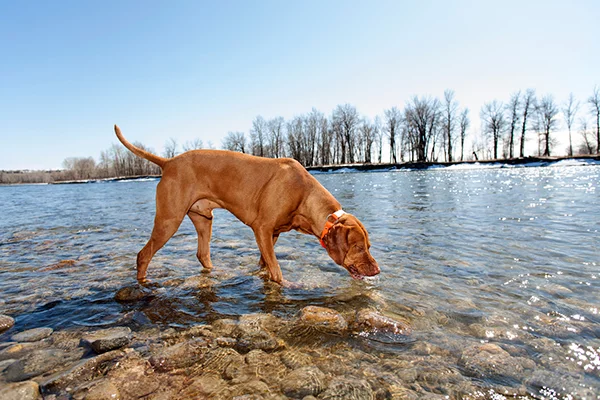6 Things to Know About Giardia in Dogs
Has your dog been diagnosed with giardia, or do you think he might have this condition? If so, you may have many questions about giardia and want to know more about what this means for your pet.

In the article below, you’ll find information about what giardia is and what it can cause in terms of symptoms for your pet. You can also learn more about how serious this problem is and what to expect if your pet comes down with an infection.
1. Giardia Is a Parasite
Giardia is a type of parasite, and the actual infection from the parasite is known as giardiasis scientifically. The parasite that causes this condition is shed in cysts through an infected animal’s feces, which allows the cysts to come into contact with the surrounding environment.
Giardia cysts can be transmitted to animals who simply sniff the dirt or feces where the parasite is present. It can also be transmitted through drinking infected water. Because of the prevalence of these cysts, most adult dogs are considered carriers of giardia, even if they do not show symptoms.
2. Giardia Is Highly Contagious
Giardia is extremely contagious. Since it is able to be transmitted to healthy animals from the moment it leaves an infected animal’s body through feces, it is widely present in situations where many dogs can be found at once. Dog parks, kennels, and vet offices are common places where giardia may be picked up.
Giardia can also be spread easily between pets living in the same household. If you have one dog who becomes infected, chances are good your other dogs will quickly pick up this parasite as well. It can be spread through licking, playing, sharing food bowls, sharing water, and even just walking in the same areas.
3. It Can Cause Digestive Issues
The most common symptom of an active giardia infection is watery diarrhea. The diarrhea may be greenish or yellow in color, or it might be brown, but it is always going to be liquid. There may sometimes be blood present in a dog’s stool as a result of giardia as well.
Some dogs who are carriers of giardia do not show symptoms at all. If a dog is infected as a puppy, he may remain sick periodically with diarrhea until he is fully grown, at which time his immune system can more easily fight off the giardia.
4. Giardia Must Be Treated with Medication
Although giardia flare-ups may come and go on their own, the parasite itself must be treated with medication. Metronidazole is the most common medication given for the treatment of giardia. It is an antibiotic that attacks the parasite and helps the dog’s body recover more quickly.
It is also important to regularly clean up after your dog if he has giardia. Pick up his feces immediately and give him a bath regularly to remove the presence of the giardia cysts from his fur. Do not let him share food or water with other dogs, as he may risk passing on the disease to them as well.
5. It’s Typically Not a Fatal Condition
Giardia is not a fatal condition, except in very young puppies or very old senior dogs. In these cases, the amount of diarrhea caused by the parasite may lead to dehydration very quickly, which can be fatal for dogs whose immune systems are compromised or have not fully formed yet.
Although the condition is not fatal, it can make your dog feel lethargic and unhappy, and he may feel some pain or nausea from the infection as well. For this reason, you should still take him to the vet for the right treatment to help him get back to normal.
6. Giardia Can Sometimes Be Given to Humans
Although rare, giardia can sometimes be passed between dogs and humans. Two of the types of giardia–type A and type B–can infect both dogs and humans, and type A can also infect cats. Therefore, you should practice excellent hygiene when handling your dog if he has been diagnosed with giardia.
Wash your hands after picking up your pet’s stool and after petting or handling your pet. Clean up your pet’s areas of the home frequently, and do not allow these areas to remain wet for too long, as giardia favors wet conditions.
When in Doubt, Contact Your Vet
With the help of this information, you should have a better idea of what to expect if your dog is diagnosed with giardia. Additionally, you can use this information to help you determine whether or not your dog is at risk of developing this infection.
If your dog shows any signs of giardia or if you have any other concerns, take him to the vet. It may not necessarily be an emergency visit, but he will need to see a vet to be given the right medication to handle the problem.
Recent Posts
About Us
At Parkway Veterinary Emergency Clinic, our team consists of experienced veterinarians and veterinary professionals dedicated to providing exceptional after-hours emergency vet care to the pet community of Lakeland.
